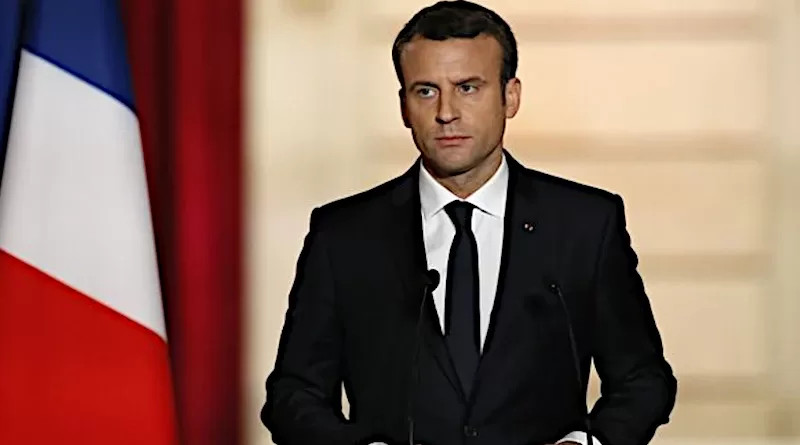Macron’s Path To A Second Term Littered With Thorns – OpEd
By Arab News
By Mohamed Chebaro*
Though President Emmanuel Macron remains favorite to win France’s next election, six months out from the vote the political scene keeps changing in a way that could lead his camp to run his campaign blindfolded, as no one can predict who his strategic opponent will be. Will it be the far right? Or the socialists, the center right or the Greens? Or will it be the right-wing populists?
As the countdown to the first round of polling on April 10, 2022, begins, the centrist president can no longer be sure that his polling numbers will get him past the post and into the second round. And, if so, who his opponent might then be.
Macron’s 2017 election win saw him face off against the far right’s only candidate, Marine Le Pen, who he easily defeated in the crucial second round. Since then, the world has evolved. Though the Donald Trump phenomenon has faded, right-wing protagonists and their narratives of hate and fear have been gaining momentum, from Hungary and Poland in the EU to the post-Brexit UK and the Trumpist movement in the US, which is making life very difficult for the centrist Joe Biden.
Domestically, all these trends are in play through a long list of protagonists vying for prominence in the race to be president, with each hoping to gain power and change France.
Head of the list, we thought, was Le Pen, the leader of the far-right Front National party, but her position is increasingly being contested by a wildcard candidate, writer and TV pundit-turned-politician Eric Zemmour, who could outpoll Le Pen and likely split the far-right vote.
Although it appears this could sideline a huge chunk of the trouble blocking Macron’s path to the Elysees for a second term, it actually does not. Zemmour, a polarizing figure who has made a career based on testing the limits of political correctness, will prove a headache for Macron and his supposed arch-rival Le Pen. Zemmour has been accusing the political class of eroding traditional Christian values and the national “French” identity. Born in Paris to Jewish Algerian parents who immigrated to France in the 1950s, Zemmour sees himself as a product of migrant assimilation, while claiming that more recent newcomers have been allowed to loathe the country and its core values. Though Zemmour has not officially announced his candidature, his uncompromising rhetoric resonates with some voters and repels others.
The list of traditional contenders includes Paris Mayor Anne Hidalgo, who has been officially nominated as the presidential candidate of France’s Socialist Party on a ticket that would champion environmental and social issues in the hope of reviving the party’s fortunes and returning it to power. Xavier Bertrand, the former labor, employment and health minister, would be a strong contender, according to the polls, if he were to face Macron in the second round. He is likely to run on the center-right Republicans’ ticket if he sees off Valerie Pecresse and Michel Barnier at the party’s congress in early December. Bertrand was one of the first to declare his intention to run back in March, when he was boosted by strong results in regional elections.
Clearly Macron will not have it easy. The positioning in electoral races is key, but in a crowded field like this it will be hard for the president to construct a line that echoes traditional French values, while undercutting the far right and offering enough economic renewal and reform to satisfy the traditional center right, without forgetting the environmental and social issues that could help him draw support from a disenfranchised left.
Long ago, Victor Hugo said that “often the crowd betrays the people.” This accurately describes today’s loud populist voices that successfully rally the people, even if we all know that fiery slogans are easy to broadcast but rarely translate into workable government policies. Macron’s choice, however, is starting to become clear, with his calling for the reawakening of France’s economic might, emulating Charles de Gaulle and Georges Pompidou to project a nuclear France, a future of electric cars, the hydrogen-powered aviation sector, decarbonization, green hydrogen, a space program, and deep-sea exploration, in addition to health, education and food security. In short, a vision that says, according to Macron, the country can be mended by his “France 2030” investment plan, which would make every French citizen salivate before cynicism kicks in.
Macron might, however, pay dearly for ignoring the grinding issues on the minds of the people, such as immigration, security and Islam, which his right-wing opponents have been playing up to an increasingly receptive, albeit still marginal, core of constituencies across France. The president has chosen to act as an incumbent for now, rallying the people around his core values and ensuring that he governs for all, despite the fact we are all living in a world where reason, ethics and values are sadly lacking.
It seems like this is a risk Macron is willing to take — telling his people to judge him on his achievements and not empty rhetoric, which is deafening in the era of social media.
- Mohamed Chebaro is a British-Lebanese journalist with more than 25 years’ experience covering war, terrorism, defense, current affairs and diplomacy. He is also a media consultant and trainer.

